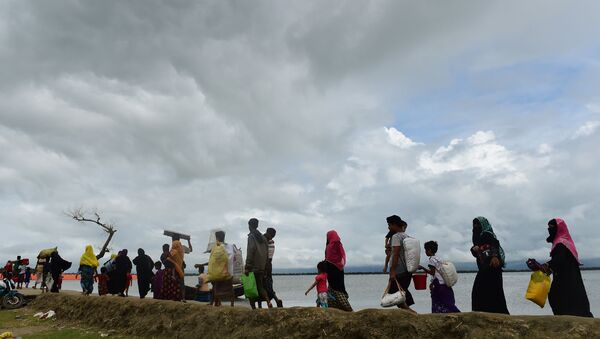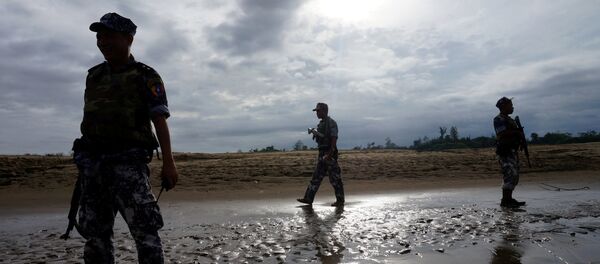Two clips allegedly originating from Myanmar's Rakhine State have been released by The Guardian on Thursday; according to the media outlet, the video was sent by Rohingya villagers escaping the region amid the recent crisis.
The first video footage shows a fire burning at the distance with a voice saying that on September 11, 2017, at 4 p.m. local time (GMT + 6:30), Myanmar's military and Border Guard police set fire to a village. It was also said that "there are nearly 200 houses in this village tract."
The second clip depicts people crossing a river and hiding in the jungle.
The media outlet pointed out that "the footage has not been independently verified by The Guardian as media access to the area is strictly controlled."
The Guardian also referred to satellite evidence obtained earlier by Amnesty International (AI), a non-governmental organization focused on human rights.
On September 14, the human rights watchdog reported "new evidence pointing to a mass-scale scorched-earth campaign across northern Rakhine State." AI claimed to have carried out a comprehensive analysis of "active fire-detection data, satellite imagery, photographs and videos from the ground, as well as interviews with dozens of eyewitnesses in Myanmar and across the border in Bangladesh."
"The evidence is irrefutable — the Myanmar security forces are setting northern Rakhine State ablaze in a targeted campaign to push the Rohingya people out of Myanmar," Tirana Hassan, Amnesty International's crisis response director said, as cited by the AI website, insisting that the situation in Myanmar amounts to "ethnic cleansing."
The human rights watchdog writes that it has managed to detect at least 80 large-scale fires in northern areas of Rakhine State since August 25.
Speaking to Radio Sputnik in early September, Chris Lewa, director of The Arakan Project, a nonprofit organization monitoring the situation on the ground in Rakhine State, raised the alarm over arsonist attacks against Rohingya villages in the region. Lewa characterized the situation on the ground as the worst in the history of the country's Muslim minority.
Gutterres called upon the Burmese government "to suspend military action, end the violence, uphold the rule of law and recognize the right of return of all those who had to leave the country."
Earlier Russian Foreign Ministry spokesperson Maria Zakharova warned that excessive pressure on the authorities of Myanmar could only lead to an aggravation of the situation in the country, adding that Myanmar's authorities can follow the recommendations of the advisory commission led by former UN Secretary General Kofi Annan.
According to the UN, up to 380,000 people from Myanmar's Rakhine State have fled into Bangladesh since August 25, while more than 1,100 children arrived in the country unaccompanied.
The Rohingya crisis started on August 25 when Muslim insurgents of Rohingya origin attacked security posts in Myanmar's Rakhine State. The tough response by the country's authorities triggered violent clashes.
The conflict originally started about a century ago: Myanmar's Buddhists view the Rohingya Muslim minority as newcomers and outcasts. The latest upsurge in tension has gradually escalated since 2011, hitting its peak in 2012 when thousands of Muslim families sought asylum in special refugee camps on the country's territory or fled to Bangladesh. Yet another escalation started in 2016.




